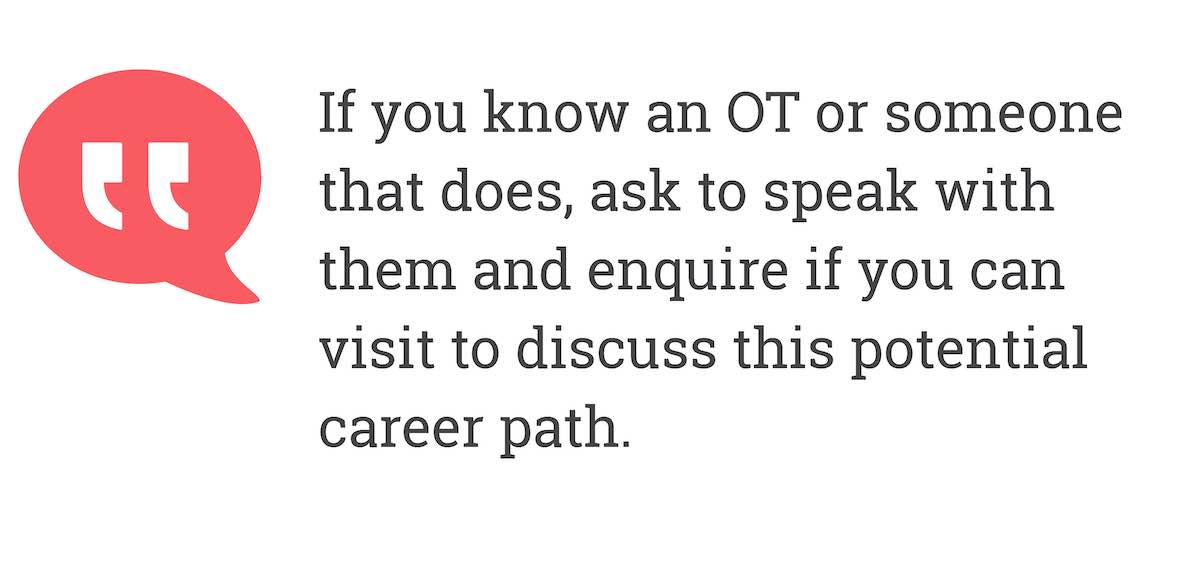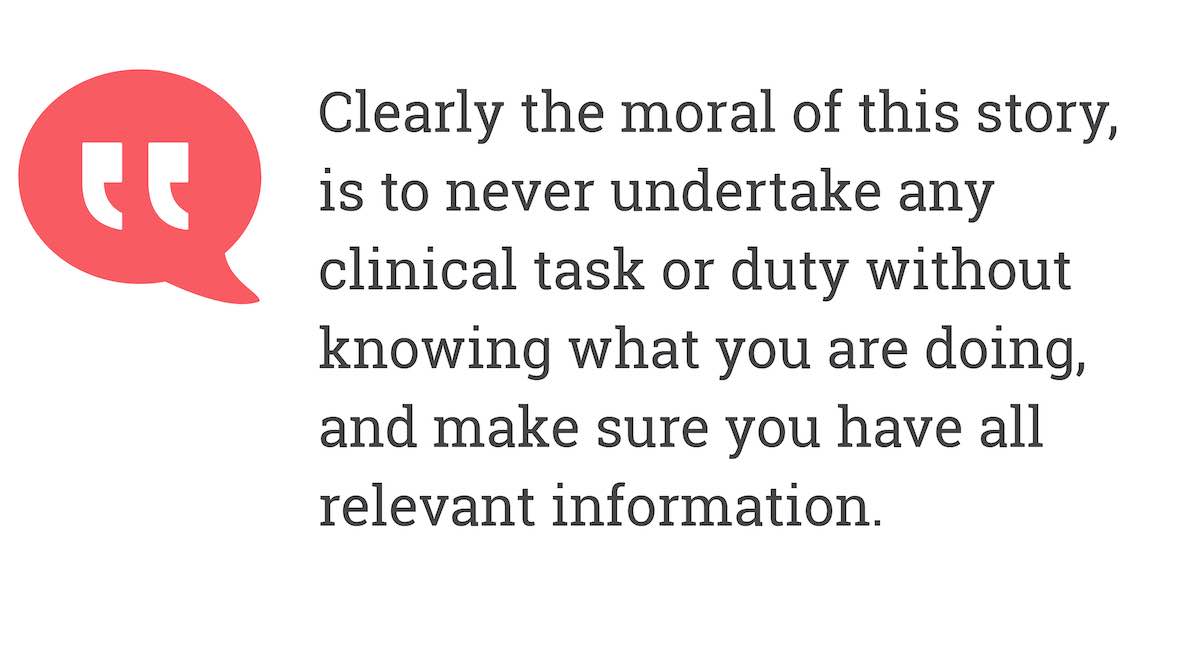- 14 August 2020
- 23 min read
How To Change Your Career And Become An Occupational Therapist
Subscribe "Occupational Therapy is so varied and continues to evolve as a profession."
"Occupational Therapy is so varied and continues to evolve as a profession."Mental Health Practitioner, Nicola, gives a complete overview of the job of an Occupational Therapist. This career guide includes great anecdotal advice to help you discover if this is a role for you.
Topics covered in this article
First Steps To Becoming An Occupational Therapist
What Kind Of Settings Do Occupational Therapists Work In?
What Kind Of Person Makes A Good Occupational Therapist
Qualifications Required To Become An Occupational Therapist
What To Expect From Your Training
Salary Expectations Once Qualified
Why I Decided To Become An Occupational Therapist
My First Post As An Occupational Therapist
How Does Working In The Private Sector Differ From NHS?
What Are The Career Opportunities?
How I Deal With The Emotions Of The Job
Interview Advice / Application Process
What Keeps Me Excited About Being An Occupational Therapist

Search Jobs
1000s of jobs for Nurses & Care Professionals. No.1 for UK nursing, care & healthcare jobs.
Search JobsWhat Is Occupational Therapy?
There are a variety of definitions used to illustrate Occupational Therapy but in essence, Occupational Therapy is the use of occupation and meaningful activity to aid rehabilitation and recovery.
Fundamental to the professions core and identity is the value of occupational engagement as a theraputic tool.
Occupations are all those tasks we do in our every day life within our personal, work and leisure environments.
Occupational Therapists can help someone to improve their activities of daily living, by assisting them to become independent after an illness or injury.
This can be through the use of simple adaptations or developing new skills, modifying tasks or changing the environment.
In summary promoting “the doing” as one of the main feature in a persons recovery.
Occupational Therapy recieves it regulation from The Health Care and Professions Council (HCPC).
Occupational Therapy and “OT” will be used interchangablity within this text to mean the same thing.
Historical Context
Occupational Therapy is a relatively new profession in health care when compared to our nursing and medical colleagues.
Orginating during the First and Second World Wars and founded to provide recreation for wounded soldiers.
Soldiers would find themselves unoccupied for long periods of time during their convalescence after battle.
Recreation specialists as they were known at the time, were created to provide meaningful occupation as way to distract from those long days or weeks of inactivity.
It became apparent that the provision of occupation and distraction in the form of meaningful activity contributed, in a favourable manner towards a soldiers longer term recovery.
The Profession of Occupational Therapy recognises its inception at this point.

What Do You Think?
Ask questions, comment and like this article below! Share your thoughts, add your opinion in the comments below.
CommentFirst Steps To Becoming An Occupational Therapist
There will be a multitude of areas where you can gain a broader understanding of Occupational Therapy.
But a good place to start is by finding out, what is in your local area.
It would be wise to gain insight by visiting a local OT department.
Larger departments within the bigger hospitals sometimes offer introductory days or visits by appointment.
You can find this out be calling the department to make an enquiry.
Keep an eye out for local healthcare recruitment initiatives.
This may be in the form of an open day where you can get to see different allied health and nursing professions altogether.
Residential settings are also a good place to visit.
This could be a elderly care home or somewhere similar.
Your local social care department will also have Occupational Therapy services.

If you know an OT or someone that does, ask to speak with them and enquire if you can visit to discuss this potential career path.
It is unlikely that you will be able to spend time with their patients due to safeguarding and confidentiality protocols.
However most OTs would be very willing to meet with you and devote a little time explaining their role.
The Royal College of Occupational Therapy can also be of great use in terms of getting started.
Occupational Therapy is a vocational pathway of study and you have got to have a strong desire to work with people that may need support looking after themselves or gaining and maintaining their independence.
Experience working with people in a health or social care setting will be beneficial.
Prior to undertaking my OT degree, I decided to get a part time job working in a residential home.
I wanted to know if I had the right character to work with people who may be vulnerable in some way.
It was one of the best things I did in preparation for my studies, as it gave me an insight into a number of clinical conditions and provided me with my first introduction into the world of health and social care.
What Kind Of Settings Do Occupational Therapists Work In?
OTs work in many different settings and organisations nowadays and the list is wide and far reaching.
Healthcare providers are having to think more creatively in terms of how they spend limited funds, utilise existing healthcare staff and promote better population health.
The drivers within health and social care are very much focused on preventative care.
This means that new and innovative settings for Occupational Therapy are being established.
An example of this is the onset of OTs accompanying Paramedics within the Ambulance Service.
The aim here is to offer falls prevention advice and education and to prevent unnessary ED attendances for elderly patients.
In addition to traditional rehabilitation hospital setting, you may find OTs working in housing, asylum seeker services, care homes, schools, mobility services and the military.
There will also be bespoke roles with certain clinical specialities, so this list is not exhaustive.
Healthcare is not standardised across the nation, so what might available in your area, may not be provided in another district.

Become A Community Contributor
Share your story to help and inspire others. Write or create a video about your job or your opinions!
ContributeWhat Kind Of Person Makes A Good Occupational Therapist?
It is important to be compassionate and have empathy.
Good problem solving skills and an ability to think creatively is essential.
Strength of character and a strong desire to make changes for the better will stand you in good stead.
Having some lived experience of disability will also be fortuitous.
Qualifications Required To Become An Occupational Therapist
The pre requiste to becoming an Occupational Therapist traditionally has been via the approved pre registration unversity programmes route.
To apply you would require 5 GCSEs A-C Level to include maths and english.
You will then need to gain 3 A-Levels.
It is preferrable to have a science subject.
There are also part time “in service” courses available if you are working in a relevant support worker role and you receive santion from your employer.
Alternate qualifications such as a BTEC or HNC that incorporates a biological science and other vocational qualifications can also provide eligbility for access to an Occupational Therapy degree or masters training programme.
However it is advisable to check this out first with your preferred university or college prior to submitting an application.
A number of universities offer the Occupational Therapy degree course and if you are considering going to university, you will need to apply via the Universities and Colleges Admission Service (UCAS).

Take your time to review your preferred university and consider what modules are offered within it, they may vary.
As part of your application process there is an opportunity to demonstrate your eligibility to become an Occupational Therapist and this is via the Personal Statement.
This is where you need to illustrate your understanding of the role.
You need to include your prior experiences which lend themselves to a career in Occupational Therapy.
It is vital that you highlight the relevant attributes and skills that make you an ideal candidate.
Anything that strengthens your application should go here.
It is imperative that you spend time on your personal statement.
Find someone “in the know” that can proof read for you.
Remember, places are sought after.
More recently there has been a drive towards degree apprenticeships in Occupational Therapy and to access this route you would need to apply via your local healthcare provider.
It is a fairly new intiative so if you do not see it advertised in your local area, call your local healthcare provider to explore is this is something they are looking to do in the near future.
What To Expect From Your Training
Courses will differ throughout the country so it is worth reviewing the propectus of your chosen universities/colleges to gain a full understanding of what modules are included and gain oversight of what each course provides.
All courses will have a module of medical science, so it will be worth investing in a decent anatomy and physiology manual once you are accepted onto a course.
Understanding what is going on underneath the body will stand you in good stead and will be great preparation for the start of your learning both in the lecture theatre and on whilst placement.
In addition to academic study, you will be required to undertake work placements for “on the job” learning.
These happen each academic year.
The university placement coordinator will make an effort to ensure you experience a variety of settings.
For example, you may find that you are given a mental health, general ward and community placement.
However you may also find yourself in a setting which may not seem obvious in terms of how an Occupational Therapy can be utilised.
My very first placement was within my local A&E department.
Full of enthusiasm and wearing my distinctive “green trousers” for the first time, I was exceedingly proud of myself for getting this far.
My over confidence was soon realigned to a more healthy realism, when my placement educator arranged for me to observe a manipulation of a broken wrist.
This is a procedure designed to re align bone structure.
Still enthusiastic and slightly over confident, I arrived to the appointed cubicle and was greeted by a very grumpy anaesthetist.
He was rather irritated due to waiting for the nurse who would assist him and also rather urgent about some blood results he needed before he could proceed.
I kindly offered to find the nurse and gather necessary the blood results.
I gleefully turned on my heels and headed down towards the main high-octane ED environment.
However as I was walking towards the hustle and bustle, it started to dawn on me that I had failed to gather the necessary information in order to locate “said nurse” and establish whatever blood results the anaesthetist needed.
But it was too late, almost simultaneously as I realised this and clearly looking a little lost, I was directed to use a tannoy to call for the nurse (this the preferred method of communication between staff within the ED department).
Before I knew it, I was delivering some vague and incomprehensible message to all in sundry within the department.
It was, pretty much one of the most embarrassing events to have occurred during my career.
I still recoil when I think about the sea of heads, yes those heads of very senior and experienced clinicians slowly looking up from their notes in a quizzical, seemingly irritated and bemused manner wondering “Who the hell is that and what on earth are they talking about”.
I spent the remainder of that placement hiding behind the photocopier and wishing to remain anonymous.
I have included this faux pas of mine as a lighthearted caution to any prospective OTs.

Clearly the moral of this story, is to never undertake any clinical task or duty without knowing what you are doing, and make sure you have all relevant information.
You may feel a little intimidated, as I did at times, by the clinical excellence which will surround you, but don’t be afraid to ask, listen and question.
You wont go far wrong if you do.
Your placement will be your opportunity to put into practice all that you have learnt during your academic term.
It is your time to consolidate and practice skills with real patients.
Don’t worry you will be very well protected and supervised at all times.
At the beginning of your placement you will meet with your practice educator and collaborate to identify your learning needs.
This will form your placement contract and set out the competencies required to successfully complete your placement.
It can be very unsettling and feel very intimidating at times but we were all students at one time or another and there will be a wealth of support out there for you during your placement.
Im sure I was forgiven once those clinicians in ED knew I was a complete novice to the ED dept and a student.
Please make the most of it.
If you are within a larger Occupational Therapy department, spend as much time as you can observing other OTs to gain a grasp of what interventions are offered within different specialities.
At the end of each placement, your practice educator will assess and make a decision if you have passed your placement.
You will have to pass your placement in order to proceed on to the next year of academic study.
The outcome of your placement will be fed back to your university.
It is an exciting time as well as being a little overwhelming but your compentencies will be achievable and inline with your academic learning.
Salary Expectations Once Qualified
As a newly qualified Occupational Therapist within the NHS structure you will start on band 5 of the NHS Agenda for Change pay system - and you can move into Band 6 or even 7 with enough experience. You can find out exactly how much that means you'll earn within our NHS Pay calculator.
Within this pay structure there are also enhancements payed for unsociable hours and these enhancements will be added to the above salary scales.
Each year there are incremental points acknowledging your level of progression professionally.
The Social care system is slightly different in terms of pay but NHS and Social care providers are within a period of integration and there is an ambition to look at harmonising pay scales in some areas so that there is equity across the two organisations.
Working as a independent Occupational Therapist can mean that you charge an hourly rate of approximately £70 with a full assessment costing up to £200 a time.
I would only advise this route once you have gained some valuable experience working within the public sector.
As an independent OT you are likely to be negotiating with statutory services so knowledge and understanding around how such organisations work will be beneficial.
Why I Decided To Become An Occupational Therapist
I decided to venture into the world of Occupational Therapy intially due to reaching a crossroads in my life.
I found myself in a position where I was working really hard with three jobs but subject to a minimum wage.
I wanted to do something that would have some longivity and career progression.
I had never heard of Occupational Therapy until it was mentioned by a Citizens Advice Bureau Worker as an alternative to my then, current employment.
It was at this stage, I began to research it and arranged to spend time with an OT.
I attended various open days to further explore Occupational Therapy.
The work seemed to be so varied depending on where or what setting your were working within.
Nursing always seemed so relentless and pressured but Occupational Therapy appeared to have a unique creativity about it.
The variety, I felt provided far less monotony than some occupations.
I still love it.
My First Post As An Occupational Therapist
Upon qualifying, I was able to secure what was then a mental health basic grade rotational post.
This consisted of 5 different mental health settings and included a ward setting, community and to be part of what was then a new initiative, a Home Treatment Team.
Each post was a six month period and then you rotated to the next clinical setting.

Sadly this type of rotational post, where you can gain a variety of experience fairly quickly, is rare to come by nowadays.
But they are worth their weight in gold if you are fortunate to secure one.
I choose to apply for a position in mental health because two of my placement were in a mental health setting.
It was where I “cut my teeth” in terms of OT skills learnt and have remained in mental health throughout my career.
I now hold a generic post but bring the unique perspective of Occupational Therapy to each patient I work with.
What A Typical Day Looks Like
Everday will start with a handover of all relevant patients you will need to see or offer treatment.
Paperwork will become a significant part of your working day and ensuring that you accurately record your interventions with patients is vital and a legal requirement.
You will be allocated work on a day to day basis or you may have a caseload of patients who you will work independantly with.
This will vary depending on where you work.
It will generally be up to you to manage and organise your day.
As well as paperwork you will have face to face contact with each patient and this will be when you undertake you home visits/practical functional assessments and any other theraputic interventions.
There are of course other obligations such as maintaining you continued professional development, so you will be required to attend relevant onward study programmes.
As you become more senior, you will undertake line management of other more junior OT staff.
There really is no set pattern to each day and it will depend on where you are working.
But the above includes all the elements that may be within a typical day.
How Does Working In The Private Sector Differ From NHS?
Working for the public sector such as NHS or Social Care can offer security in terms of equity of pay and conditions.
There is also, the potential for better access to training within the larger organisations.
However there are private organisations that will also provide the same terms and conditions as NHS and an example of these are Social Enterprises which are funded by the NHS.
One of the benefits of working as an OT within a larger organisation is the opportunity for movement around different clinical specialties and the ability to network with other OTs.
This is invaluable when starting out as a preceptor OT.
However as you become more experienced, you may wish for greater independence.
Government cuts and refinements can sometimes mean that in the NHS you may have limited treatment options due to a funding cap.
If you choose to work as an independent OT, you can set your own terms and conditions, create your own tariff of charges and decide upon your preferred treatment options.
Going it along or within a smaller organisation, may offer you the abilty to be more more creative.
It may also allow you more freedom and automony.
What Are The Career Opportunities?
The NHS is changing rapidly.
Health and Social care providers are within a period of evolving integration, the emphasis now being on greater collaboration between all health, social care, voluntary and non statutory sectors.
This means much more creativity when it comes to career development and opportunity.

The deficit in terms of recruitment and retention of healthcare staff in recent years, has also prompted better use of existing healthcare staff by upskilling.
One such example of career development is the upskilling into advanced practice roles.
Advance level practice has been a key term used in nursing for a number of years, however we are now starting to see advanced clinical practice within allied health care professions such as Occupational Therapy.
OTs now have the same opportunities as other health professions when it comes to enhancing skills, clinical leadership and extended scope of practice.
This means further opportunities in terms of greater job variation and clinical career enhancement.
How I Deal With The Emotions Of The Job
The job can be stressful and at times upsetting.
But the aim is to ensure that you mediate this work related stress by undertaking regular clinical supervison.
Because I am in a generic post, I have opted to have two clinical superviors, one an OT and another allied health professional.
By utilising both, I get a good cross section of advice within my area of practice.
Looking after your own health and wellbeing is crucial, Taking regular exercise, getting a good nights sleep and eating healthy are all important.
Learn what you can control and what you cant.
The pressure can be immense, but the rewards equally so.
Interview Advice/Application Process
There will often be a set structure to an interview process.
Prior to departing your university in your final year, you are likely to receive coaching regards job applications and interview practice.
However the most valuable piece of advice I can offer is to ALWAYS ask to visit the team or department prior to your application and or interview.
You need to ask about the format of the interview.
For example, what are they expecting?
Will you have to do a presentation?
How many will be interviewing you?
What sort of questions might they ask you?
They of course will not tell you exactly their line of questioning, but if you ask they might give you an indication of what they are looking for.
If you visit, you can then have a look at the team, see if it’s a place you like.
The whole process is as much for you as it is for them.
Ask for the operational policy and read the person specification and job description before you submit your application.
These documents set out what the job is about.
Find out what the current policy drivers underpinning that clinical speciality are.
Most larger health care organisations will have there own application process and are unlikely to want a CV in addition to this.
Within the NHS the person specification, attached to the job application, will set out what the essential and desirable criteria are for the position you are applying.
You will need to illustrate that you meet the essential criteria, else you will not be short listed.
At the end of your application form there will be another opportunity to sell yourself and provide examples of your work experience or to provide further evidence in terms of the criteria you meet.
Please read and re read the application notes.
REMEMBER; you have to meet the essential critera to be short listed and Good Luck!
What Keeps Me Excited About Being An Occupational Therapist
Occupational Therapy is so varied and continues to evolve as a profession.
The Coronavirus has subjected thousands of people to lengthy periods of intensive care support and some have been left with residual injury and impaired function.
These people will now rely on an Army of Occupational Therapists, to get them through the next phase of their recovery and I suspect with exisiting but also new and innovative methods.
To adapt, overcome and find new ways of working with patients is embedded into the ethos of Occupational Therapy and I cannot think of a better profession to be part of in this current time.
There will always be challenges in healthcare and the onset of COVID 19 illustrates this perfectly.
But to help some one at their most vulnerable and possibly make a difference , I think is still a most priviledged position indeed.
Let me know in the comments your thoughts on becoming an Occupational Therapist and what I've said about my journey - let's chat there!
Oh, and please Like this article to let me know you enjoyed it - thank you!






About this contributor
Mental Health Practitioner and Occupational Therapist
I work within a Mental Health Home Treatment / Crisis team and have done so for the last 15 years. At present I am undertaking advanced clinical practice study to develop my consulting and clinical skills.
More by this contributorWant to get involved in the discussion?
Log In Subscribe to commentMatthew Gordon
Matthew Gordon
3 years agoHi, I really enjoyed this article. I have no experience in healthcare but possibly looking at a change and like ... read more
Hi, I really enjoyed this article. I have no experience in healthcare but possibly looking at a change and like the idea of OT. Would it be possible for me to get into OT with training on the job? If so, what is the best route for this? Thank you
read less